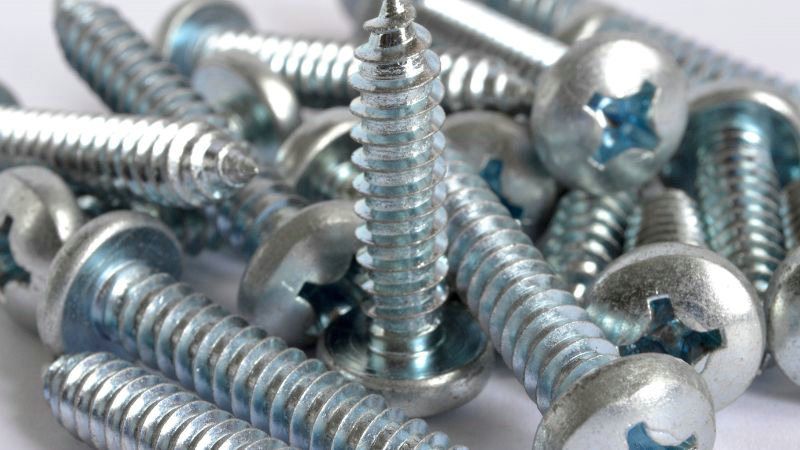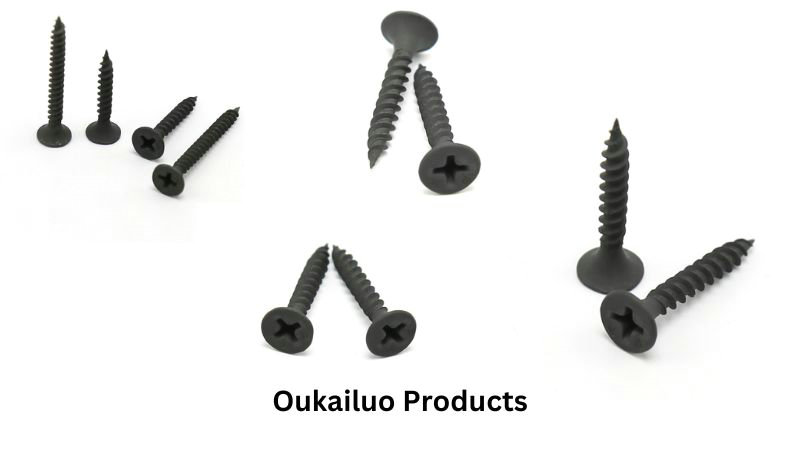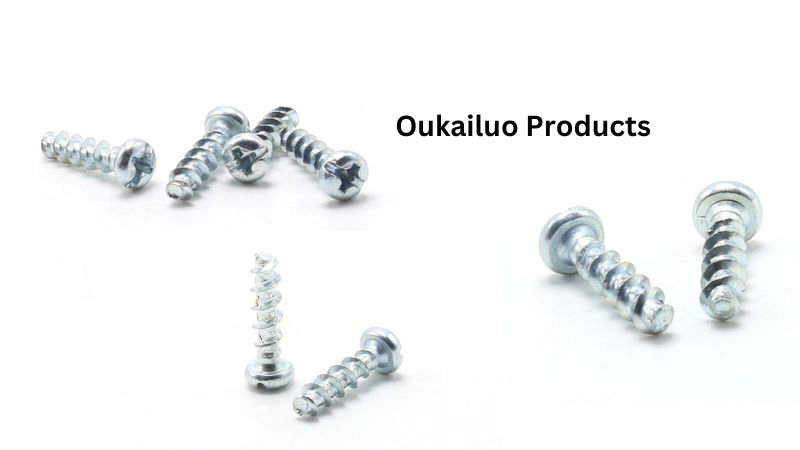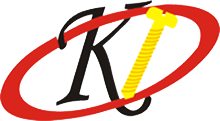Threads are the ridges you see on screws and bolts. These ridges help these fasteners hold materials together.
Follow Oukailuo to learn the difference between fine thread and coarse thread and determine which one to choose when you start your project.

What are the Fine Threads?
Fine threads are specialized fastener threads with narrow and shallow ridges characterized by a smaller pitch and more threads per axial distance.
Where to Use Fine Threads
Fine threads are ideal when you’re dealing with materials that require high strength and precision. They are often used in:
- Aerospace applications: due to their higher tensile strength and resistance to cross-threading.
- Electronics: where precision is key and materials are generally softer or thinner.
- Plumbing: finer threads seal better under high pressure, preventing leaks.
In detailed woodworking projects or delicate applications where the material might split easily, fine threads offer better engagement and holding power.
What are the Coarse Threads?
Coarse threads have broader and deeper ridges compared to fine threads. They feature greater thread height and more material between each thread, resulting in stronger flank engagement.
Where to Use Coarse Threads
Coarse threads are better suited for:
- Construction applications: their wider and deeper ridges grab into materials like wood and plastic tightly, and they are less likely to strip when fastened, making them perfect for structures.
- Woodworking: when you need a fastener that is easy to start and can handle the stress of dense materials.
- Quick assembly/disassembly tasks: their design allows for rapid installation and removal without cross-threading risks.
Moreover, in outdoor or corrosive environments, the larger space between the threads in coarse-threaded fasteners allows for better dissipation of debris and moisture, which is critical to prevent seizing.
Advantages and Disadvantages
When considering fine and coarse threads, you’ll find that each type presents unique benefits and potential downsides.
Benefits of Fine Threads
- Increased Strength: Fine threads can handle more stress and are generally stronger because of their larger minor diameter.
- Precision: They allow for finer adjustments in applications that require a high degree of accuracy.
- Better Holding Power: Fine threads are less likely to loosen under vibrations due to their smaller helix angle.
Benefits of Coarse Threads
- Easy to Handle: Coarse threads are easier to start and assemble, which can save you time during installation.
- Greater Durability: They tend to be more durable in tough environments and are less prone to cross-threading.
Possible Drawbacks
- Fine Threads:
- Can be more difficult to assemble correctly and are more susceptible to damage from mishandling.
- Their increased strength comes at the cost of being less tough, meaning they can be more prone to fatigue and wear over time.
- Coarse Threads:
- Have a lesser holding strength, making them less suitable where fine adjustments or a high degree of precision is necessary.
- Their larger pitch makes them less than ideal in applications that need to withstand vibrations since they may loosen more easily.
Mechanical Properties and Strength
Tensile Strength and Load
Fine threads offer you a strength advantage due to their larger stress area. This means you can achieve a higher tension and bolt preload with fine threaded fasteners under the same tightening torque. It’s important to note that the smaller pitch of fine threads allows for finer adjustments, which could be crucial for some of your applications.
Shear Resistance and Vibration Control
In terms of shear resistance, coarse threads are generally more favorable. Their design allows for a better distribution of shear loads across the threads. You’ll find coarse threads to be especially beneficial in applications where shear strength is a major concern, such as in aluminum or cast iron materials where fine threads might easily strip.
For situations where vibration resistance is necessary, fine threads could be beneficial as they have more thread engagement. This engagement can lead to a more secure hold, minimizing the risk that your fastener will loosen under vibrations.
How to Select the Right Thread for Your Job?
Factors in Choosing Thread Type
To make an informed choice between coarse and fine threads, start by looking at the material you’ll be working with. Coarse threads are generally better for brittle materials. This spacing also allows for quicker assembly, as the screw takes fewer turns to go in.
Furthermore, fine threads might be the preferred option if you need a stronger engagement with fewer chances of stripping. If you’re using metal or an alloy, fine threads might be suitable because they can tap into these harder substances more effectively.
Ensuring Proper Thread Engagement
Thread engagement is how deep the screw goes into the material. With thread engagement, your main goal is to make sure the screw holds securely. Fine threads require deeper engagement to grasp the material properly. This becomes important in applications where you need maximum hold strength, as fine threads can provide more resistance to pulling out.
For coarse threads, you don’t need as much engagement, but you must ensure that the threads are not too shallow. If they are, you risk the screw stripping the material, which means it no longer holds properly. It’s crucial that the threads match the fastener sizes and that the screw threading is compatible with the material to prevent stripping or weakening the hold.
Screws From Oukailuo
3.5*25 Fine Thread Drywall Stud Screws

Specifically designed for drywall applications, these screws feature finely spaced threads that provide exceptional grip and holding power. The 3-525 size is ideal for fastening drywall to wood or metal studs, reducing the risk of loosening over time.
Key Features
- Corrosion-Resistant Coating: Ensures durability and longevity, even in challenging environments.
- Optimal Size (3-525): Perfect for fastening drywall to both wood and metal studs.
- Easy Installation: Compatible with standard screwdrivers and screw guns for quick and efficient driving.
- High-Strength Construction: Prevents loosening over time, maintaining the integrity of your installation.
- Versatile Use: Ideal for new construction projects, renovations, and repairs.
Self Tapping Coarse Thread Screws

The pan head design provides a smooth, flat surface that sits flush against the material, making them perfect for applications where appearance matters. As self-tapping screws, they effortlessly create their own mating threads, eliminating the need for pre-drilling and speeding up the installation process.
Key Features
- Self-Tapping Capability: Creates its own threads, eliminating the need for pre-drilling and speeding up installation.
- Versatile Application: Suitable for a wide range of materials, including wood, metal, and plastic.
- Durable Construction: Offers long-lasting performance and superior holding strength.
- Multiple Sizes Available: Accommodates various project requirements and specifications.
Frequently Asked Questions
Are fine threads stronger than coarse threads?
Yes. For screws of the same size, fine thread screws are generally stronger than coarse thread screws.
Do fine or coarse threads resist rust better?
Rust resistance depends on the screw’s material and any protective coatings it has, rather than the thread type. Neither fine nor coarse threads have an inherent advantage in resisting rust. For more information, refer to our guide on protecting buildings from corrosion.
When should I use fine thread screws versus coarse thread screws?
The choice depends on your specific project needs. Generally, coarse thread screws are best for brittle materials such as plywood, OSB (Oriented Strand Board), or SPF (Spruce-Pine-Fir), and for attaching to thin metal sheets. On the other hand, fine thread screws are ideal when you require a stronger hold in harder materials or when precise adjustments are necessary.
